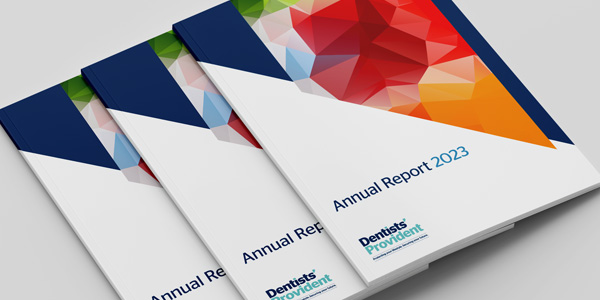
The majority of young dentists love their profession, and although there can be challenging times and new and tough experiences to deal with, dentistry can still be the most exciting and worthwhile career. It’s also more than just a job, a profession you have spent blood, sweat and tears and a lot of time and money to follow. However, that doesn’t mean you don’t love a long weekend, a two-week trip away or even a few months sabbatical to travel…but what if the time you had away from your profession wasn’t your choice?
Introduction
A short or extended period away from work due to an injury or illness can not only be stressful and painful, but could also cause you financial worries and a loss of clinical skills and experience, even making you nervous to go back to work. This is often exacerbated if the injury or illness has an impact on your ability to practise dentistry.
Sickness absence of dentists
When you are young you never think anything will happen to you, but the statistics tell a different story. Dentists’ Provident 2018 claims statistics show that the age of the youngest claimant was 27 and over a quarter of all claims were with dentists under 45.
Dentists’ Provident claims experiences also support the well-known fact that musculoskeletal disorders and mental health issues are the main areas of health concern for dentists, and this could be due to the physically and mentally demanding nature of the job. Around one-third of our claims paid are consistently for musculoskeletal disorders and approximately one-sixth for psychiatric disorders.
Last year a dentist in their late 20s had to take a week off after pulling their back undertaking an extraction, also a young dentist had to take a month off for an intervertebral disc displacement and another had to take nearly two months off work as a result of a heart attack. Our income protection plan gave them the financial security they needed to focus on their recuperation and return to work without having to worry about their household finances.
A vulnerable profession
Dentistry is such a physical profession, requiring flexible hands and fingers, good eyesight and the ability to move freely without pain in your neck or back, and it only takes a relatively minor injury to prevent you from doing your job. Add to that the risk of stress-related illnesses and it’s clear that dental professionals are exposed to the risk of illness or injury at any age.
Without some form of health protection to support you when you need it, the impact of being unable to work, whether for a couple of weeks, several months or much longer, could be devastating, particularly if you have bills, debts or dependants. It could be worth having a conversation with your principal to see if your practice would help you if you were off, especially if you are at different practices. They are likely to have to pay for a locum to cover your patients to minimise the impact on the team and your principal’s business, so they may not be able to help at all, so having your own protection could be the best option.
Health insurance and protection
A quick internet search or visit to a comparison site on the web will reveal that there is plenty of choice for different health insurance plans, so it’s good to take a step back and consider what you really need if you are self-employed in a practice or if you are employed and have limited protection from your hospital/university. Unfortunately the devil’s in the detail and when you’re time poor it can be a daunting prospect to sift through all the options.
There are also several different types of providers, from high street insurers and banks to friendly societies and mutuals whose policies are generally more specialised. For example, a plan with a Holloway contract, has a long-term savings element alongside the insurance so would give you money on retirement. Because of the amount of choices available to you, we would always recommend you speak to an independent financial adviser who knows how things work with dentists.
Below are the different types of health protection plans
Critical Illness Insurance
A critical illness policy would become payable should you suffer a critical illness during the term of the plan and will provide a lump sum. This lump sum could be used to repay your mortgage or other debts, it could replace lost income or it could be used to make any modifications to your home which might be needed as a result of suffering a critical illness. Critical illness plans can range in their level of conditions covered with some plans being more comprehensive than others. Typical conditions covered may include stroke, heart attack, certain types and stages of cancer and conditions such as multiple sclerosis. Some critical illness policies can include cover should you come totally and permanently disabled as a result if an illness or injury. You could have a critical illness plan which includes life cover. Once the plan has paid out its benefit, the plan will then cease.
Life Insurance
A life insurance policy will become payable should you die within the term of the policy and will provide a lump sum. This lump sum could repay any debts so that your assets could pass to your beneficiaries unencumbered or provide a lump sum to your dependents. A life insurance policy could include a terminal illness benefit which is payable if you are diagnosed as suffering from an advanced and rapidly progressing incurable illness and you are expected to die within 12 months of diagnosis and before the end of the plan. This is designed to aid the life assured and their family at such a difficult time. Once a life policy has paid out its benefit, the plan will then cease.
Private Medical Insurance
Private medical insurance is an insurance policy which helps to cover the cost of private healthcare. It works in a similar way to any other insurance where you pay monthly or annual premiums and your provider pays out for some or all of the costs of the private medical treatment you receive.
Long Term Care Insurance and Later Life Policies
Provides financial support should you have to pay for care assistance for yourself or a loved one. This type of cover can be taken out in case care is needed in the future or once the cover is needed. Long term care is need when a person is unable to look after themselves, for example, following stroke. These sums can be used to buy care in the home or fund residential care home fees.
Accident, Sickness and Unemployment insurance (ASU)
Is a short-term protection plan that can replace your income for up to 12 months should you become unable to work due to accident, sickness or involuntary redundancy. There is usually a specified deferred period, for example, the plan would need to be in place a set number of months prior to a redundancy claim. You would usually link the benefit level to match your mortgage and other monthly committed outgoings.
Income protection
Income protection insurance pays you a regular income, often until your retirement age, if you cannot work because you are ill or injured, in return for you paying a regular premium.
For dentists, certain elements of income protection insurance can be more significant than for other professions not only because you receive regular continual payments when you are off sick but because you are mainly qualified to undertake your profession, despite any other qualifications you may have, so are more at risk of not being able to do it. This is why it can be sensible to consult financial advisers with specific experience of your profession, perhaps asking some of the following questions:
Richard Lishman managing director of 4dentists group said “Some companies allow you to make a claim for lost income as a result of one day’s absence due to sickness while others have a restriction of a few days. The time between the onset of illness and being able to make a claim on your policy is known as the deferred period, but bear in mind the length of period you choose, as you wouldn’t be able to claim during that deferred period. The shorter the deferred period, the more the cover will cost however, so it’s a balance for what suits you. If you have sufficient savings, for example, and you could maintain your lifestyle and pay your monthly bills for a period of three months, then you could have a plan which would pay out a benefit once you have been unable to work for three months or longer. But you might not wish to eradicate your hard-earned savings if you are ill and so opt for a short deferred period on your income protection. The policy can be tailored to fit your individual requirements.
Richard finished by saying “You have invested a lot of time and money into your studying and training and so therefore it is likely that you wish to cover your ability to be a dentist rather than your ability to work in general.”
Looking after your physical and mental wellbeing could mean you don’t need to call on these services for your whole career. However life is never that predictable, so take the time to step back and review what you have so that you can enjoy your career knowing you are supported by the right organisations that will be a safety net if the unthinkable happened and you got ill or injured.
References available on request.
This article is intended for general information only, it is not designed to provide financial, health or other advice, nor is it intended to make any recommendations regarding the suitability of any plans for any particular individual. Nothing in this article constitutes an invitation, inducement or offer to subscribe for membership or additional benefits of Dentists’ Provident.
No responsibility or liability is assumed by Dentists’ Provident or any copyright owner for any injury or damage to persons or property as a consequence of the reading, use or interpretation of its published content. Whilst every effort is made to ensure accuracy, Dentists’ Provident, the authors, Editors and copyright owners cannot be held responsible for published errors.
Dentists’ Provident exercises editorial control only over material published and/or produced by it. No responsibility or liability is assumed by Dentists’ Provident for any articles produced or reproduced in third party publications and/or websites.
The views or opinions expressed do not necessarily reflect views of Dentists’ Provident or copyright owners. Inclusion of any advertising material does not constitute a guarantee or endorsement of any products or services or the claims made by any manufacturer.
If you have any questions, please contact our member services consultants by emailing press@dentistsprovident.co.uk or calling 020 7400 5710.
If you have any questions, please contact our member services consultants by emailing
memberservices@dentistsprovident.co.uk or calling 020 7400 5710.

Our 2024 Annual General Meeting will be held at 91-94 Saffron Hill, London, EC1N 8QP on Friday 24th Ma…
Read more
The 2023 annual report from Dentists’ Provident, a leading income protection provider for dental profe…
Read more
Our next exhibition is the British Dental Conference & Dentistry Show in May, where we look forward to meeting anyone interested in becoming a member or members wanting to discuss their plans.